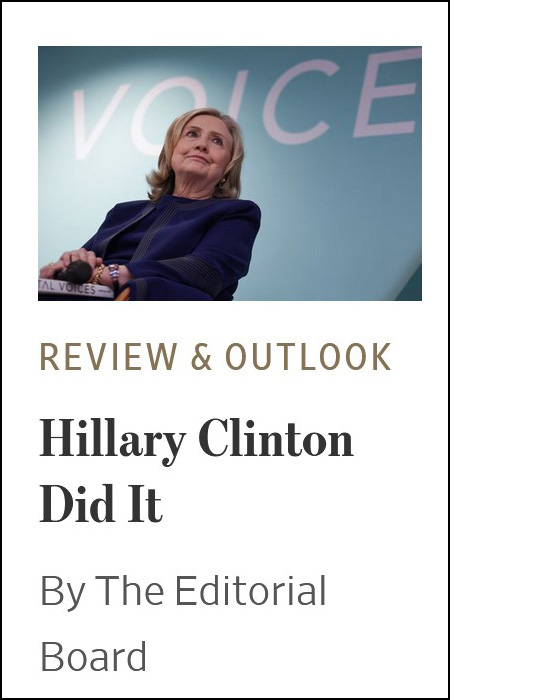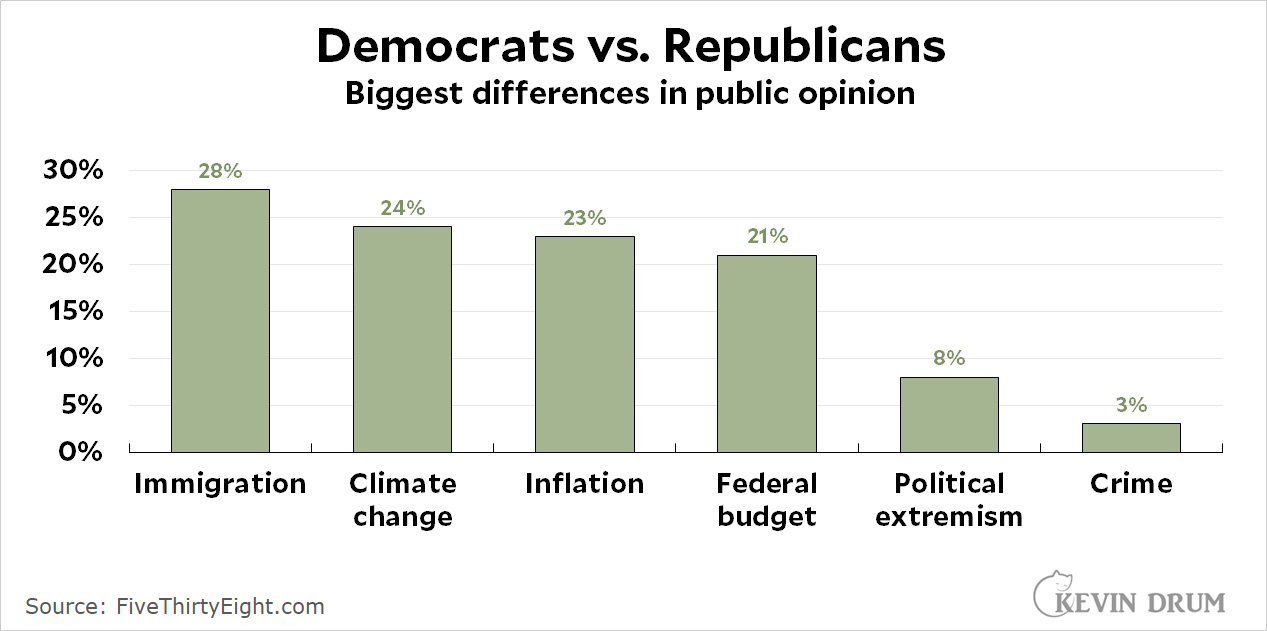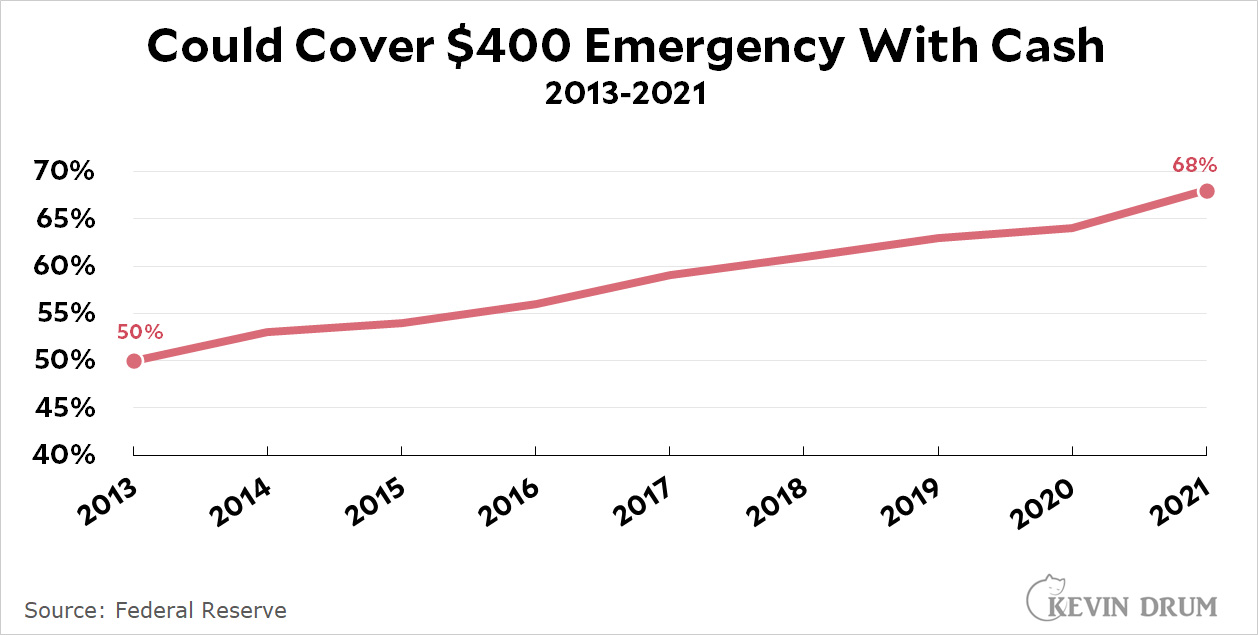I'm on vacation cruising down the Seine, so my threshold for commenting on dumb stuff is higher than usual. What's more, the proximate cause of my latest annoyance is the Wall Street Journal editorial page—which is sort of like saying I'm annoyed by cancer. I mean, I am annoyed by having cancer, but I'm annoyed by it every day and it's hardly worth bitching about it every time I get an upset stomach or something.
That said, I'm awake while Marian is still snoozing and I have nothing special to do. So here's the latest from the Journal's distinguished editorial board:
 Well, of course Hillary did it. That goes without saying in Journal land. But what was it this time? Did she kill Elon Musk? Steal Joe Biden's stash of Diet Coke? Pull the heist of the century by emptying Fort Knox?
Well, of course Hillary did it. That goes without saying in Journal land. But what was it this time? Did she kill Elon Musk? Steal Joe Biden's stash of Diet Coke? Pull the heist of the century by emptying Fort Knox?
Nah. None of that. Apparently she ran for president a few years ago and her campaign manager, Robby Mook tried to interest the press in some dirt about her opponent:
Prosecutors asked Mr. Mook about his role in funneling the Alfa Bank claims to the press. Mr. Mook admitted the campaign lacked expertise to vet the data, yet the decision was made by Mr. Mook [and some others] to give the Alfa Bank claims to a reporter. Mr. Mook said Mrs. Clinton was asked about the plan and approved it. A story on the Trump-Alfa Bank allegations then appeared in Slate, a left-leaning online publication.
On Oct. 31, 2016, [Jake] Sullivan issued a statement mentioning the Slate story, writing, “This could be the most direct link yet between Donald Trump and Moscow.” Mrs. Clinton tweeted Mr. Sullivan’s statement with the comment: “Computer scientists have apparently uncovered a covert server linking the Trump Organization to a Russian-based bank.” “Apparently” is doing a lot of work in that sentence.
In short, the Clinton campaign created the Trump-Alfa allegation, fed it to a credulous press that failed to confirm the allegations but ran with them anyway, then promoted the story as if it was legitimate news.
Hold the presses! A campaign passed along to the press some potential dirt that they hoped might lead to further digging. It wasn't something they "created," either: it had already been a widespread subject of rumor and investigation on blogs and Twitter for months (I was alive back in 2016 so I know this). Nor did "the press" run with it. A bunch of reporters tried to run down the allegations, but none of them was able to. Finally one person, Frank Foer of Slate, took a flier and decided to publish everything he could dig up. This is a common way of attracting the attention of sources who might be able to add something to a story.
And the Clinton campaign's shameful conspiracy to take advantage of Foer's piece? Two whole tweets!
All things considered, Foer probably made the wrong call. There were lots of questions about the Alfa Bank activity but not enough to justify a fishing piece. But that's it. A close but wrong call.¹
So in the end this was one of the most common and trivial things imaginable: a campaign trying to get the media interested in digging around a possible bit of mud. It's hard to think of anything more commonplace or basically innocuous in the world of presidential campaigns.
ALSO: The Clinton campaign merely passed along some information they hoped was worth checking out. But when it comes to feeding false information to the press and then quoting it back as confirmation when it's published, the all-time king is Dick Cheney during the marketing phase of the Iraq War. Or, more recently, Rudy Giuliani and the Hunter Biden laptop. Oddly, though, I don't remember the fine and honest folks of the Journal editorial page ever getting distressed about either of these things.
AND: As long as I'm at it, the Journal also offhandedly claims that this incident and others started the FBI's long Trump-Russia investigation. This is, unsurprisingly, an outright lie. The timeline of the investigation is very well known and it began not with Hillary Clinton but with a Trump advisor telling an Australian diplomat over drinks about alleged Russian emails that were damaging to Clinton. The Australian government passed this along to the FBI after Wikileaks published hacked DNC emails. This happened in July 2016, months before the Alfa Bank allegations.
¹And to Foer's credit, he promptly published a follow-up piece noting objections and new information about the Alfa Bank story.











